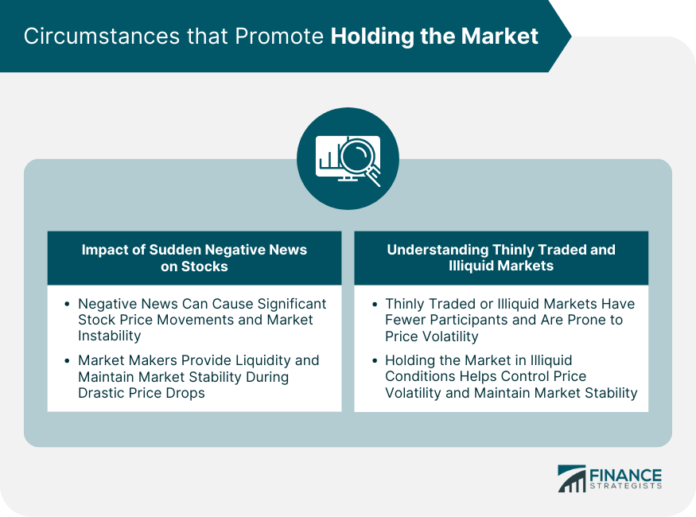A market maker is a crucial participant in financial markets, responsible for providing buy and sell quotes to ensure liquidity. When there is an imbalance in supply and demand or when trading becomes difficult, market makers step in by buying or selling assets to maintain liquidity, preventing sharp price fluctuations. Market makers play a key role in a variety of markets, including stocks, futures, and foreign exchange, helping to stabilize the market and facilitate smooth transactions.
Market makers can be thought of as “market lubricants” as they continuously provide two-way quotes (bid and ask prices) to narrow the spread between buyers and sellers, increase liquidity, and lower transaction costs. Their presence not only enhances market efficiency but also offers investors more trading opportunities, ensuring that the market remains operational even in times of high volatility or low trading volume.
Table of Contents
Requirements for Becoming a Market Maker
To qualify as a market maker, an individual or institution must meet several stringent criteria. Below are the key qualifications needed for certification as a market maker:
1. Approval from Financial Regulators
Market makers must register with and obtain approval from the relevant financial regulatory authorities. These agencies ensure that market makers operate within the bounds of the law and have the appropriate qualifications to serve the market. Different countries have their own financial regulators, such as the U.S. Securities and Exchange Commission (SEC) and China’s Securities Regulatory Commission (CSRC), which oversee market makers’ qualifications and activities.
2. Financial Strength
Market makers must possess significant financial resources to withstand market risks. Given that market prices can fluctuate wildly, market makers need to have sufficient capital to absorb unexpected changes and continue providing liquidity. Financial strength directly impacts the stability and sustainability of a market maker’s operations.
3. Technological Expertise
Advanced trading technology is essential for market makers to efficiently quote and execute trades. Financial markets are fast-paced, and market makers must rely on state-of-the-art platforms and algorithms to react quickly to price changes and market conditions. Technological capabilities not only affect trade execution efficiency but also determine a market maker’s competitiveness.
4. Risk Management Capabilities
Effective risk management is crucial for market makers to navigate the potential dangers of market volatility. In times of significant price swings, market makers must employ robust risk control mechanisms to protect their assets. Good risk management helps market makers minimize losses and maintain stability in their market-making activities.
5. Experience and Skills
Market makers must have a deep understanding of financial markets, along with substantial trading experience and skills. Recognizing market opportunities and risks, while devising effective trading strategies, is critical for success. Given the fast-paced nature of trading, experience and a keen insight into market dynamics are invaluable.
Rights of Market Makers
As key players in financial markets, market makers enjoy certain unique rights that help them fulfill their duties and generate profits.
1. Information Advantage
Market makers have access to all buy and sell orders in the market, providing them with a significant informational edge. By understanding market supply and demand, they can anticipate price trends and adjust their quoting strategies accordingly, allowing them to gain a competitive advantage in trading.
2. Profit from Bid-Ask Spread
One of the primary ways market makers generate revenue is through the bid-ask spread, the difference between the price they are willing to buy and the price they are willing to sell. Since market makers consistently provide liquidity, traders are willing to accept this spread for the convenience of executing trades promptly.
3. Priority in Financing and Securities Lending
To ensure market liquidity, market makers are often given priority access to low-cost financing options or the ability to borrow securities. This advantage allows them to quickly secure the resources needed to maintain liquidity during periods of market stress or imbalances in supply and demand.
4. Right to Short Sell in Certain Conditions
In markets where buyers outweigh sellers, market makers may be granted the right to short-sell assets. This ability helps market makers continue trading when there is an excess of buying pressure, thereby maintaining liquidity and stabilizing market conditions.
Responsibilities of Market Makers
In addition to their rights, market makers also bear several important responsibilities to ensure their actions positively contribute to the market’s overall health.
1. Provide Fair and Transparent Quotes
Market makers are obligated to provide fair and transparent buy and sell quotes, allowing all participants to trade in an open market environment. They must not manipulate prices for personal gain and are required to adhere to relevant laws and market rules.
2. Ensure Market Liquidity
One of the core duties of a market maker is to ensure that there is always sufficient liquidity in the market. Whether the market is in a bull or bear phase, market makers should strive to provide enough liquidity to avoid extreme price swings, which is a fundamental reason for their existence.
3. Monitor Market Conditions
Market makers must continuously monitor changing market conditions and adjust their strategies and quotes in response to shifts in supply and demand. This not only helps the market function smoothly but also reduces the risk that market makers face from sudden price movements.
Conclusion
Market makers are vital participants in financial markets, ensuring liquidity and facilitating smooth trading by consistently providing buy and sell quotes. While they benefit from certain privileges, such as information advantages and the ability to profit from the bid-ask spread, they also have important responsibilities, including maintaining fair practices and ensuring market liquidity. By understanding the role and responsibilities of market makers, we gain deeper insights into how financial markets operate efficiently.
Apart from that if you want to know about How to Start an Agency and Sign Clients Quickly then please visit our Digital Marketing Category.
Frequently Asked Questions (FAQs)
1. How do market makers make money?
Market makers primarily profit from the bid-ask spread they offer on trades. In addition, they can also earn from financing or securities lending activities.
2. Do market makers face significant risks?
Yes, market makers are exposed to various market risks, especially during times of high volatility. To mitigate these risks, they need strong financial backing and effective risk management practices.
3. Are market makers present in all financial markets?
No, not all markets have market makers. They are more prevalent in markets that are less liquid or have smaller trading volumes, such as certain stocks, futures, or forex markets.
4. Can market makers manipulate prices?
Market makers are subject to strict regulations and cannot manipulate market prices for personal gain. Their actions are closely monitored by financial regulators to ensure fairness and transparency.
5. How can someone become a market maker?
Becoming a market maker requires registration and approval from financial regulators, along with meeting specific criteria such as financial strength, technological capabilities, and risk management skills.
6. Are market makers beneficial to the market?
Yes, market makers provide liquidity and help stabilize prices, playing an essential role in the smooth functioning of financial markets.



























